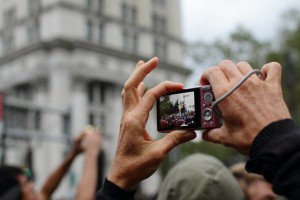
One of many pictures of Occupy Wall Street protesters storming the Brooklyn Bridge from Flickr. Cameras and smartphones were recording everything. Credit: PaulSteinJC via Flickr.com
Back in January, Twitter received a subpoena from the Manhattan district attorney’s office asking for “any and all user information” related to the account from Sept. 15 to Dec. 31, 2011. A few days later, Harris’s lawyer filed a motion to quash, saying that the subpoena did not comply with federal laws. The lawyer, Martin Stolar, also wrote that the request was overly broad, suggesting that the prosecutors might be using the information for investigative purposes, not just as evidence in the charge of disorderly conduct. Last month, the court denied Stolar’s motion to quash. As Stolar explained to Salon’s Natasha Leonard:
The judge decided that Harris has “no standing” to fight the subpoena in the first place — because his tweets (including direct messages, which are not publicly published) are not his, but belong to Twitter. The judge also rejected Stolar’s claim that Harris has a privacy interest in quashing the subpoena.
Twitter apparently disagrees. The social media company filed its own motion to quash the order denying Stolar’s motion to quash. In it, Twitter points out that its Terms of Service unequivocally state that users “retain [their] rights to any Content [they] submit, post or display on or through” Twitter.
“This is a big deal,” writes Senior Staff Attorney Aden Fine on the ACLU’s blog.
Law enforcement agencies—both the federal government and state and city entities—are becoming increasingly aggressive in their attempts to obtain information about what people are doing on the Internet….
The Internet is an amazing way for people to communicate with anyone they want to, whenever they want to, on whatever subject they want to discuss—all (mostly) for free. It is, in some ways, the ultimate embodiment of the First Amendment. But one potential problem for free speech on the Internet is that, for almost all of us, we need to rely on Internet companies. And while the government is bound by the First Amendment, the First Amendment may not always prevent private companies from restricting our free speech rights.
That is why it is so important to encourage those companies that we all increasingly rely on to do what they can to protect their customers’ free speech and privacy rights. And that is why it is so important that the public—and other companies—know when a company actually stands up for its users’ rights.
Twitter did so here, and Twitter should be applauded for that. We hope that other companies will do the same thing.
Harris, now tweeting as @BigMeanInternet wrote at 1:57 pm today:
Oh sweet, it’s public. Twitter motioned to quash my subpoena all on their own, saying that I do retain rights to my content.
— Malcolm Harris (@BigMeanInternet) May 8, 2012
And, a few minutes later:
I’m thinking this bodes well for my request currently in to Twitter PR to borrow one of their giant blue birds and ride it into court.
— Malcolm Harris (@BigMeanInternet) May 8, 2012

